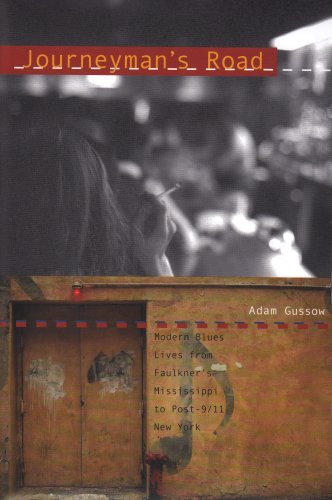By Adam Gussow, associate professor of English and Southern Studies at the University of Mississippi
University of Tennessee Press, 2007
 REVIEWS
REVIEWS
Adam Gussow has lived the Blues life. By some miracle he has also lived to write about it. Whether his subject is a novel by Faulkner or the romance of buying an amp, his prose is as dynamic as a guitar solo by Stevie Ray Vaughan.
—Krin Gabbard, Author of Black Magic: White Hollywood and African American Culture
Adam not only knows the blues…he feels it. Read this book and you will too.
—Shemekia Copeland
This book bridges the seemingly disparate worlds of the blues bar and the college seminar as few, if any, others do—eloquently arguing that blues music and blues communities can be significant galvanizing forces in the human experience.
—Roger Wood, author of Texas Zydeco and Down In Houston: Bayou City Blues
Journeyman’s Road offers a bold new vision of where the blues have been in the course of the twentieth century and what they have become at the dawn of the new millennium: a world music rippling with postmodern contradictions. Author Adam Gussow brings a unique perspective to this exploration. Not just an award-winning scholar and memoirist, he is an accomplished blues harmonica player, a Handy award nominee and veteran of the international club and festival circuit. With this unusual depth of experience, Gussow skillfully places blues literature in dialogue with the music that provokes it, vibrantly articulating a vital American tradition.
Journeyman’s Road tells unfamiliar stories about a popular American art form, takes contrarian positions, explodes familiar mythologies, and frames the contemporary blues scene in bold, new ways. Taking its title from Gussow’s self-described status as a “journeyman,”-a musician who has completed his apprenticeship and is well on his way to becoming a master-this new book brings together articles that Gussow wrote for publications such as Blues Access and Harper’s, as well as critical scholarly essays, including the first comprehensive examination of William Faulkner’s relationship with the blues.
At the heart of Gussow’s story is his own unlikely yet remarkable streetside partnership with Harlem bluesman Sterling “Mr. Satan” Magee, a musical collaboration marked not just by a series of polarities-black and white, Mississippi and Princeton, hard-won mastery and youthful apprenticeship-but by creative energies that pushed beyond apparent differences to forge new dialogues and new sounds.
Undercutting familiar myths about the down-home sources of blues authenticity, Gussow celebrates New York’s mongrel blues scene: the artists, the jam sessions, the venues, the street performers, and the eccentrics. At once elegiac and forward-looking, Journeyman’s Road offers a collective portrait of the New York subculture struggling with the legacy of 9/11 and healing itself with the blues.
Filled with photographs and complete with a comprehensive bibliography, Journeyman’s Road is an expedition through the evolution and culture of the blues, a trip filled with the genre’s characteristic collisions and contradictions, paradoxes and multiplicities, innovative calls and often unexpected responses.